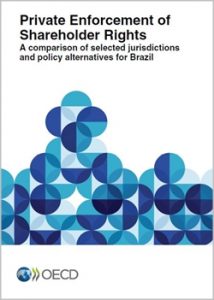Professor Martin Gelter, an expert in comparative corporate law and governance, contributed an overview of the law of shareholder derivative litigation in nine countries in a new report published by the Organisation for Economic Co-operation and Development (OECD), Private Enforcement of Shareholder Rights: A Comparison of Selected Jurisdictions and Policy Alternatives for Brazil. The report is the output of a joint project involving the OECD and Brazil’s Securities and Exchange Commission (Comissão de Valores Mobiliários-CVM) and Ministry of Economy. It is intended to support the strengthening of Brazil’s framework for the private enforcement of shareholder rights.
 Gelter was selected for this task by the OECD based on previous work with the organization, as well as a number of publications on private enforcement of shareholder rights, including his 2012 article “Why do Shareholder Derivative Suits Remain Rare in Continental Europe?“ and the 2019 book Global Securities Litigation and Enforcement, which he coedited. Gelter’s contribution to the OECD report covers shareholder derivative litigation in the U.S., the U.K., France, Germany, Israel, Italy, Singapore, and Spain. The report explores differences not in the legal framework, including the important role of pre-trial procedures that create a gateway to more effective derivative litigation. In addition, the report explores the incentives set by corporate and procedural law for minority shareholders to litigate claims against corporate directors and controlling shareholders.
Gelter was selected for this task by the OECD based on previous work with the organization, as well as a number of publications on private enforcement of shareholder rights, including his 2012 article “Why do Shareholder Derivative Suits Remain Rare in Continental Europe?“ and the 2019 book Global Securities Litigation and Enforcement, which he coedited. Gelter’s contribution to the OECD report covers shareholder derivative litigation in the U.S., the U.K., France, Germany, Israel, Italy, Singapore, and Spain. The report explores differences not in the legal framework, including the important role of pre-trial procedures that create a gateway to more effective derivative litigation. In addition, the report explores the incentives set by corporate and procedural law for minority shareholders to litigate claims against corporate directors and controlling shareholders.
Based on his analysis, the report recommends a series of detailed policy proposals to address weaknesses in the frameworks for derivative suits and arbitration in Brazil and actions to strengthen the country’s framework for the private enforcement of shareholder rights. “A country may have an excellent law governing self-dealing transactions by directors and controlling shareholders,” Gelter says. “However, in the absence of an effective enforcement mechanism that incentivizes shareholders or entrepreneurial attorneys to litigate such claims, an excellent law may remain all but irrelevant. Capital markets will only benefit from good law if there is an adequate enforcement mechanism.”



